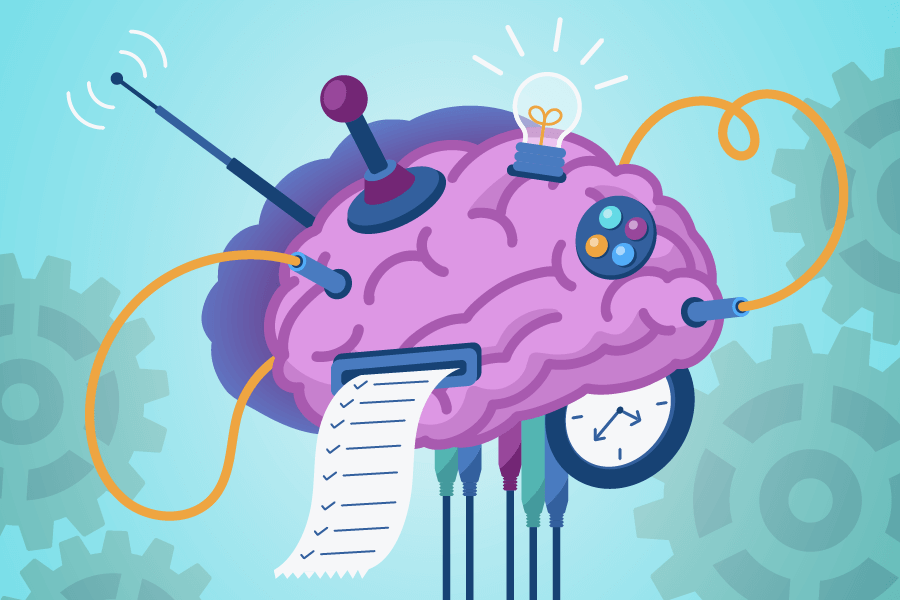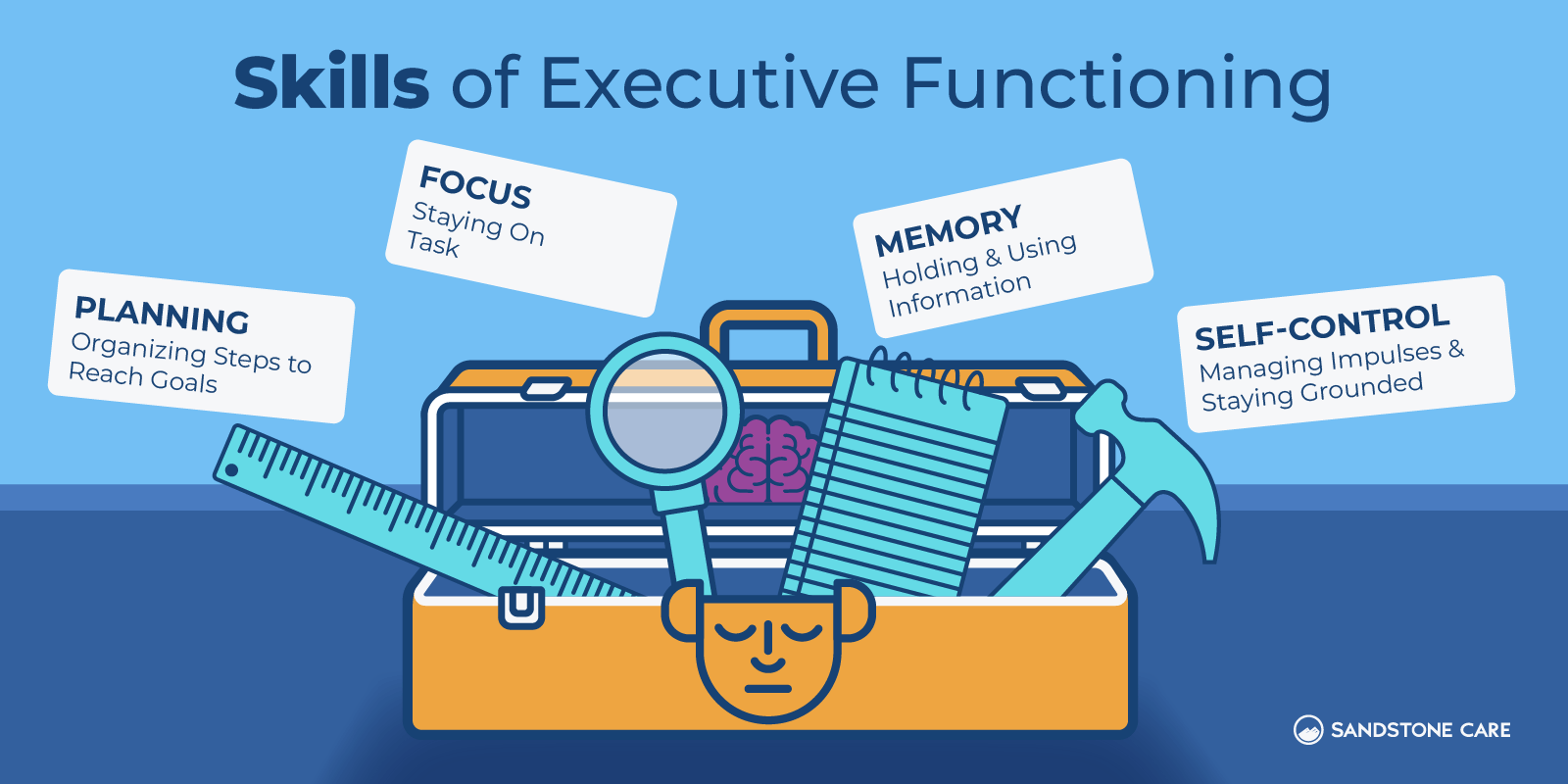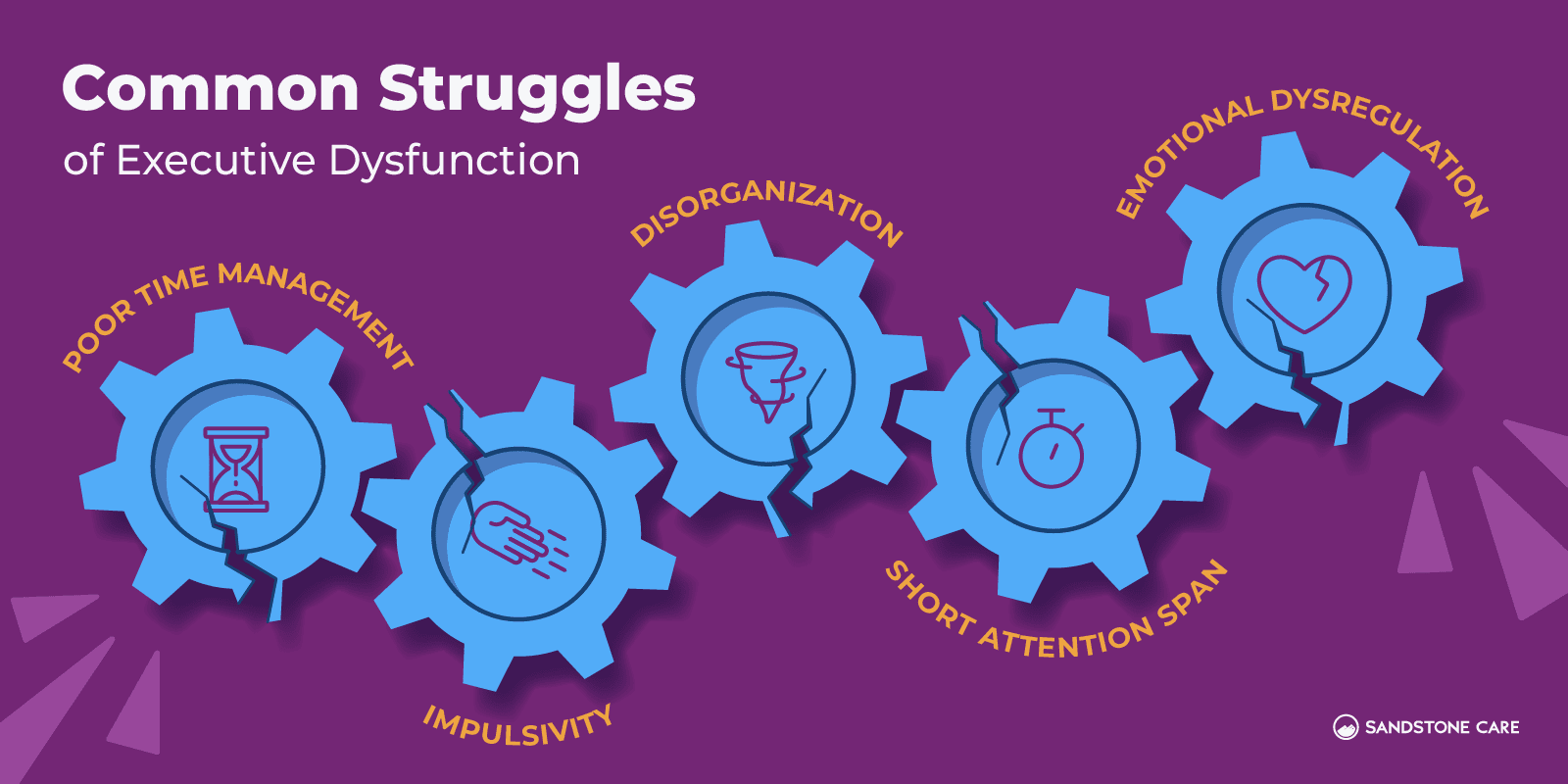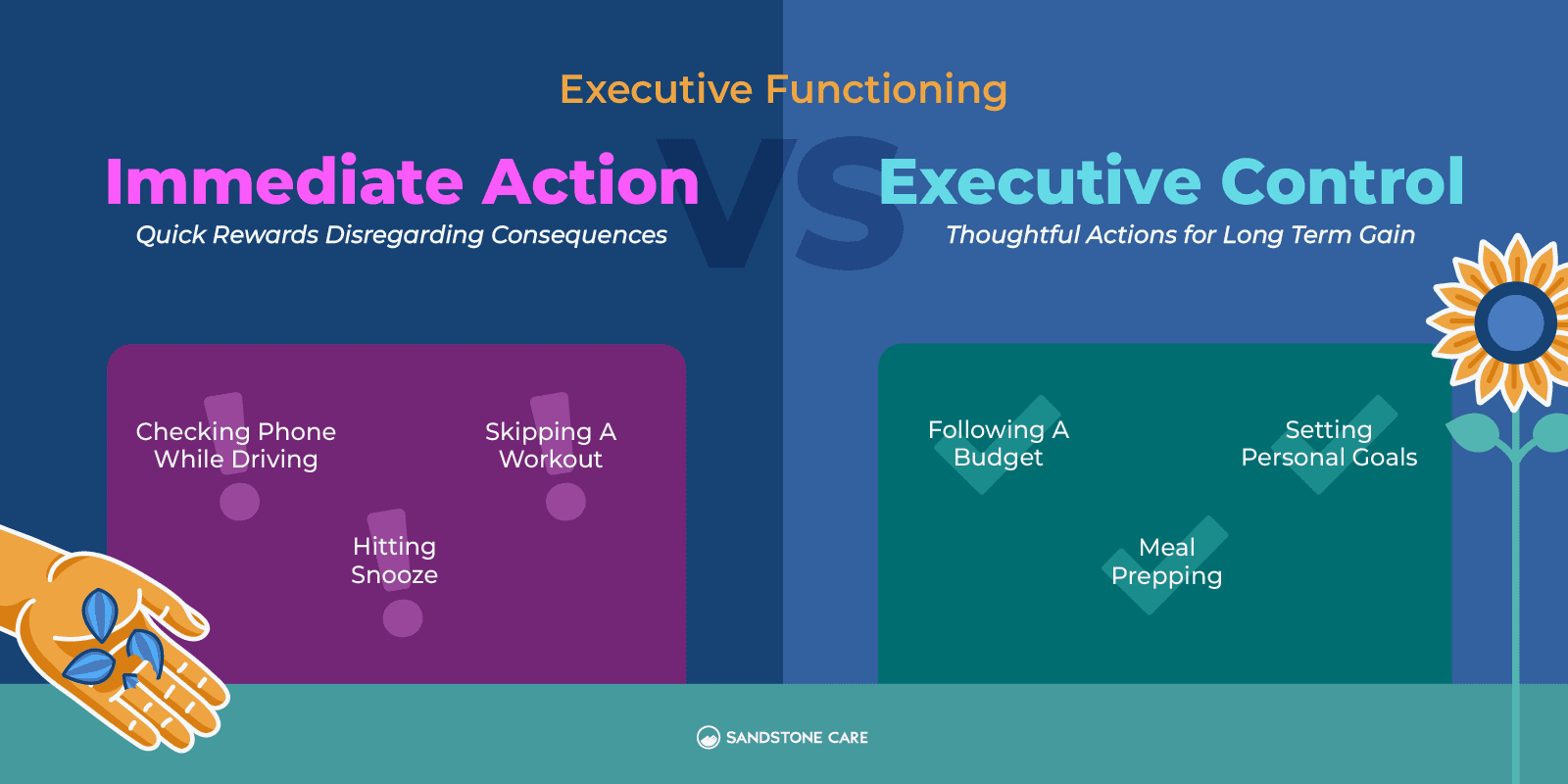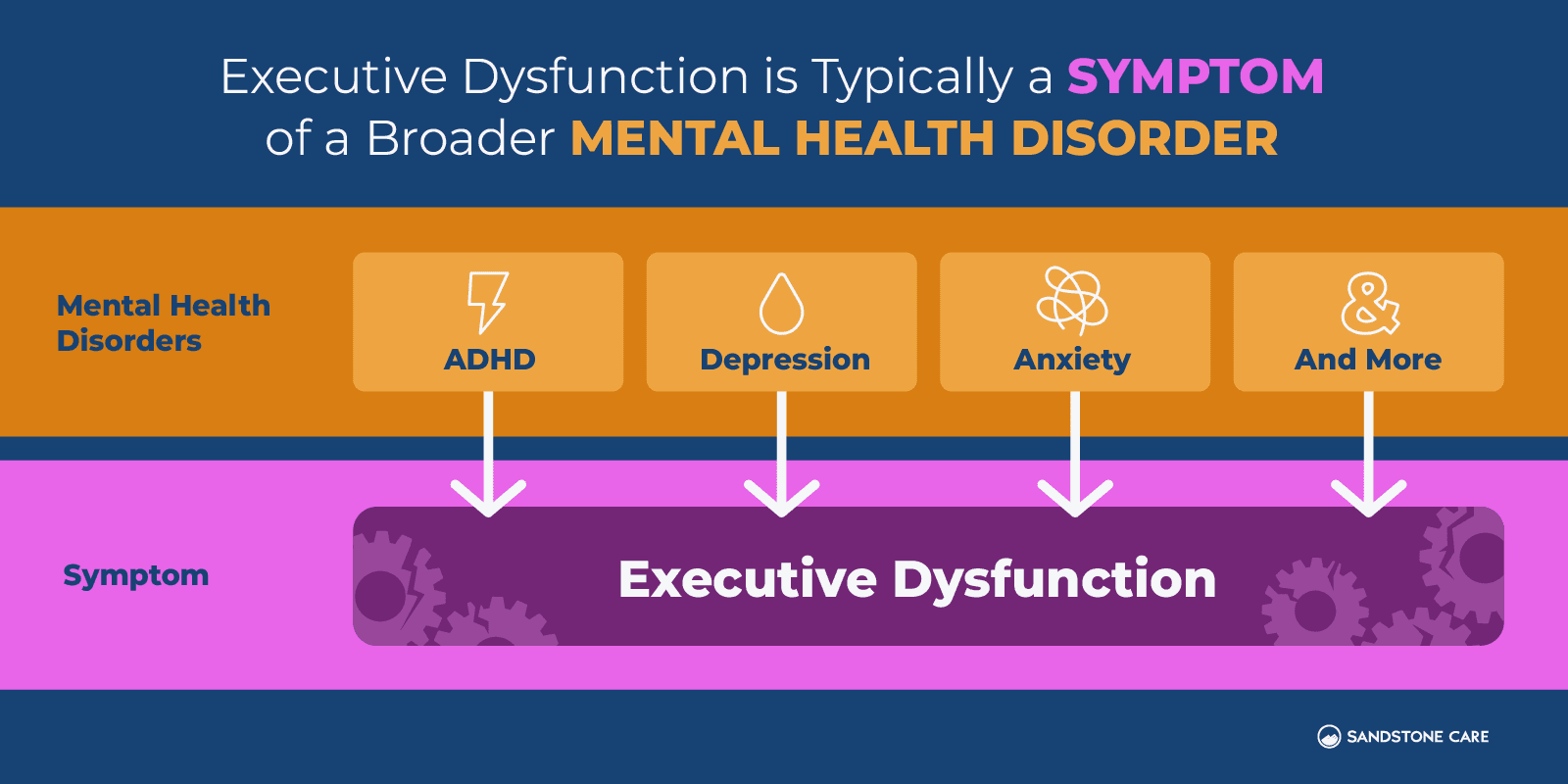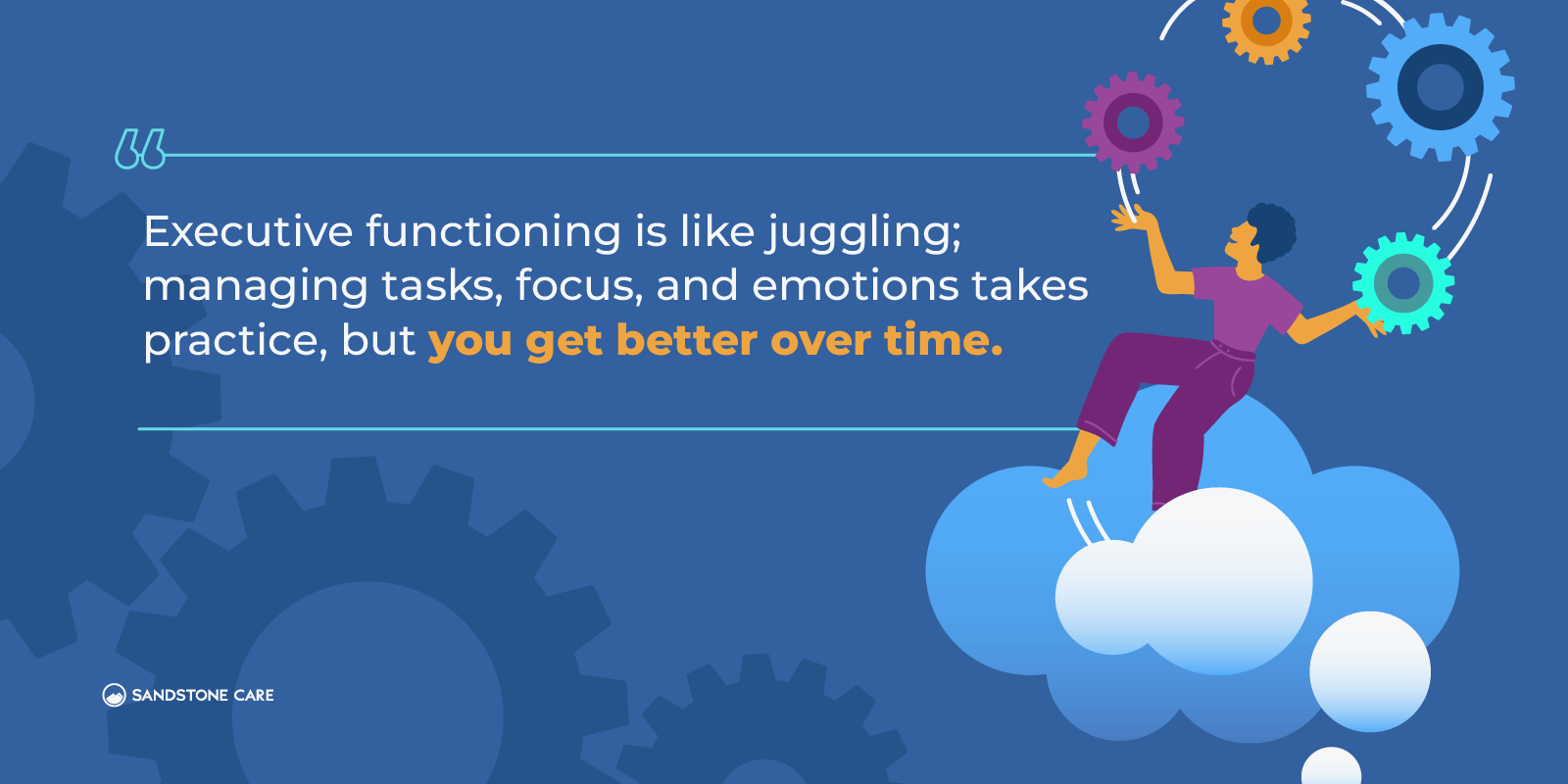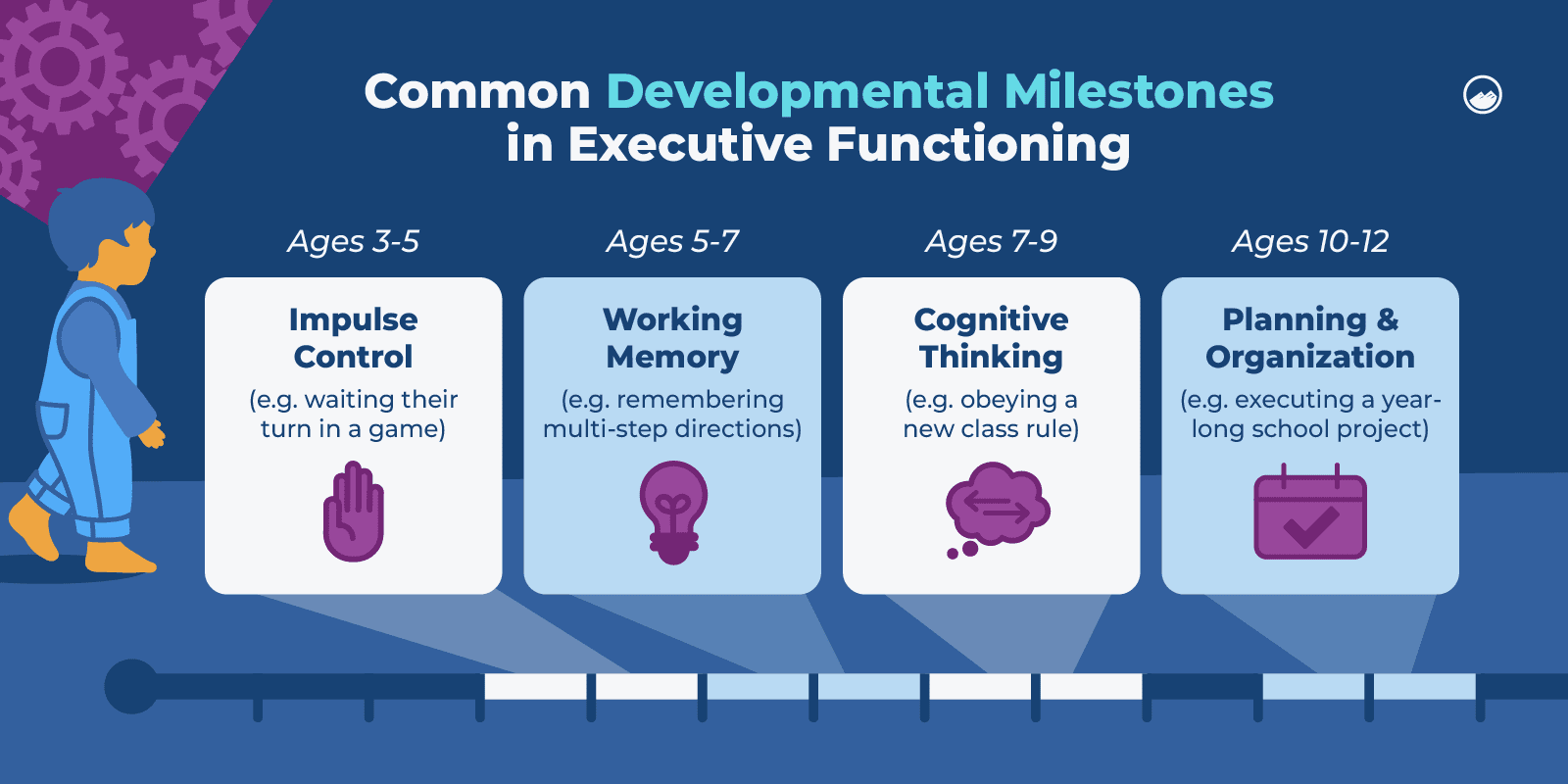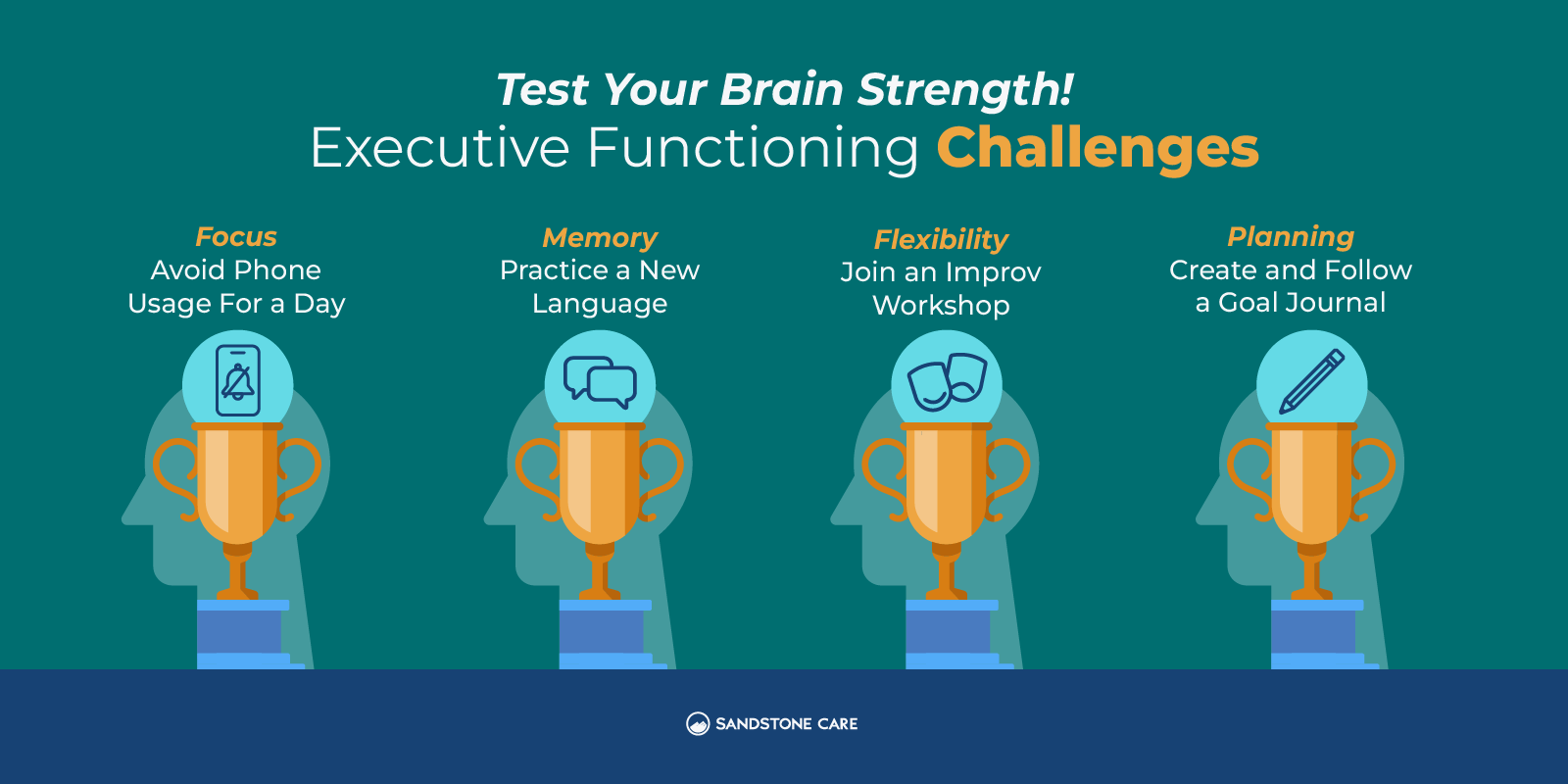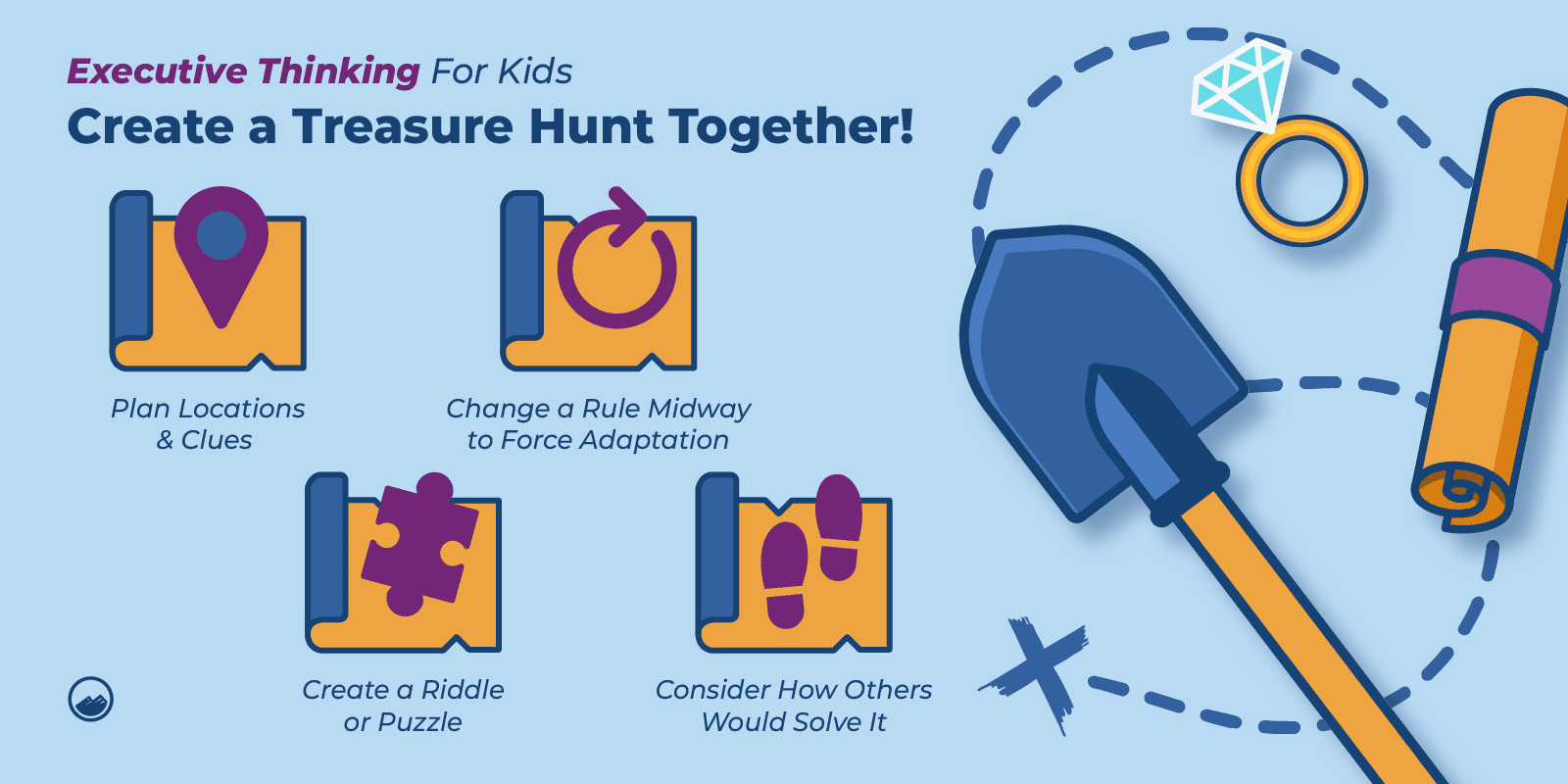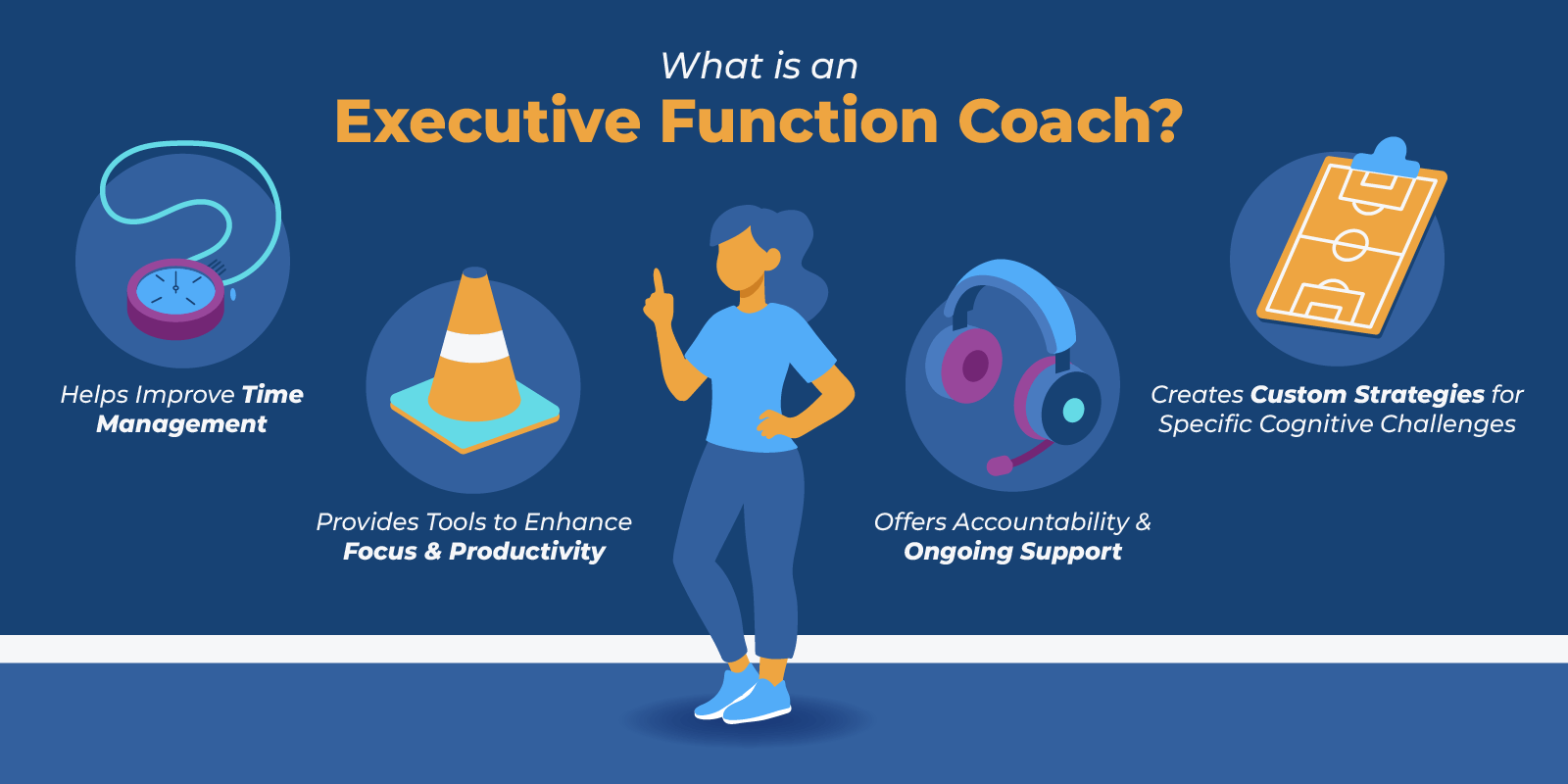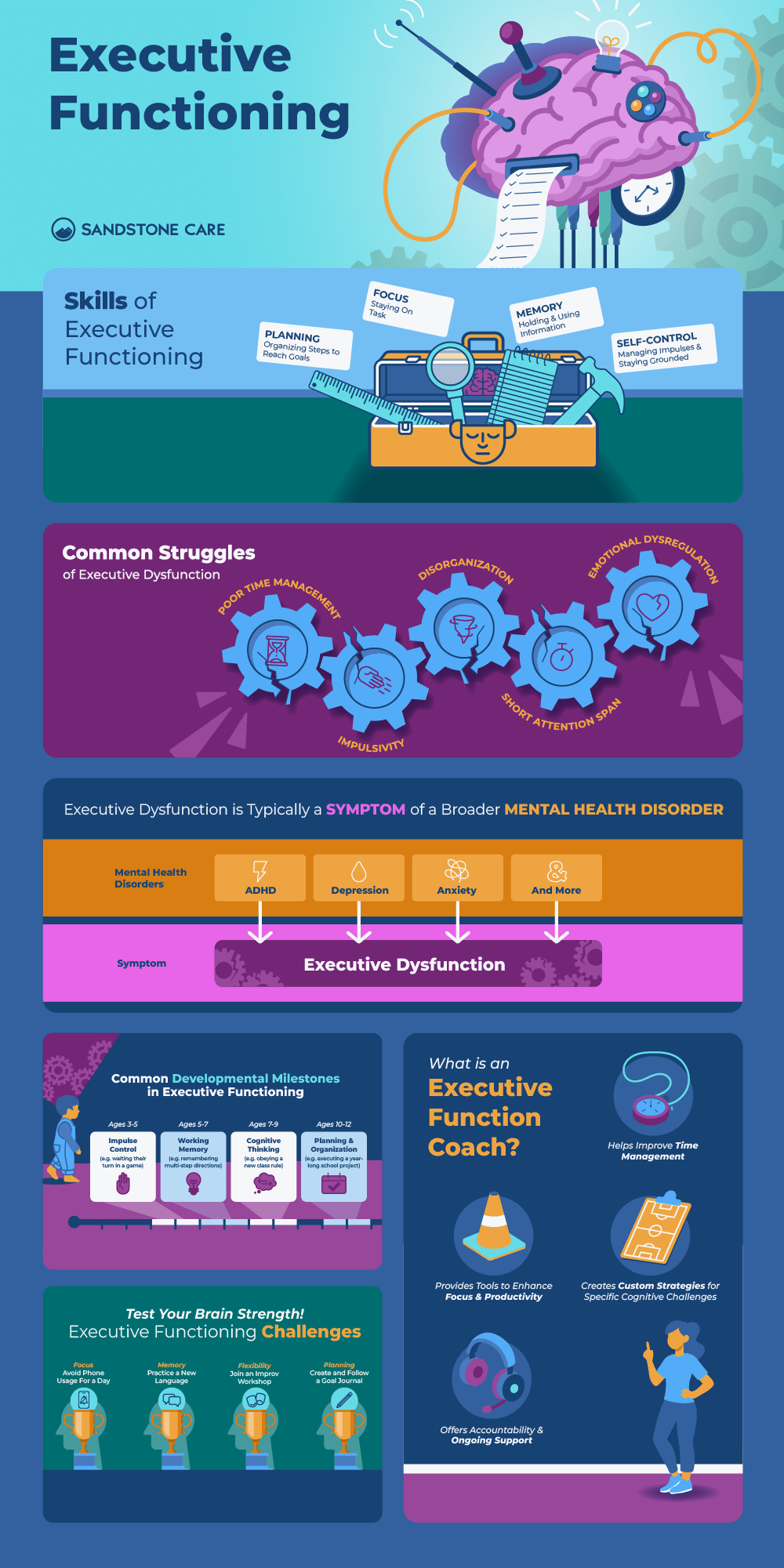Executive Functioning
What Is Executive Functioning?
“Executive functioning” describes the set of skills and ways of thinking that help each person set and accomplish their goals. These skills also dictate daily life and behaviors and facilitate self-control and problem-solving skills.
Executive functioning skills can help people maintain their goals and plan ahead while improving emotional regulation and decision-making to create a healthy daily life.
What Are the 3 Areas of Executive Functioning?
Executive functioning can be divided into three important categories: working memory, cognitive flexibility, and self-regulation.
These three aspects of executive function work together to complete tasks, overcome challenges, and manage personal goals.
What Are the 7 Executive Functions?
Seven executive functions work together to create effective executive functioning in daily life:
- Self-awareness
The ability to use mindfulness practices and monitor personal growth - Inhibition and self-restraint
The ability to stymie impulses and act with intention - Nonverbal working memory
Retaining information about senses, places, and more - Verbal working memory
Retaining verbal information, directions, or speech - Emotional regulation
Identifying and managing one’s emotional state and engaging in effective emotional control, especially when faced with stress - Motivational regulation
The ability to push oneself to accomplish a goal and set effective rewards - Planning skills and problem-solving strategies
Engaging in a flexible and comprehensive approach to new problems or hurdles
What Are Poor Executive Functioning Skills?
Some poor executive functioning skills include:
- Poor time management skills
- Mood swings or poor impulse control
- Mental or physical disorganization or messiness
- Low attention span or compromised short-term memory
- Repeating similar mistakes
Poor executive functioning skills can lead to many challenges and could be classified as executive function disorder (EFD) or executive dysfunction.
People may have difficulties managing their emotions, tending to goals or expectations, adjusting to new responsibilities or tasks, or addressing multiple tasks at once.
What Is the Difference Between ADHD and Executive Function Disorder?
While executive function disorder and ADHD can have a large amount of overlap, there are distinct differences between the two.
First, ADHD is an official diagnosis in the Diagnostic and Statistical Manual of Mental Disorders (DSM-5), whereas executive dysfunction and executive function disorder are not an official diagnosis.
While those living with ADHD may experience compromised executive functioning skills and executive functioning challenges, the causes can also be different.
For many, symptoms and signs of ADHD can develop during child development, while executive function disorder can develop for a myriad of reasons at any point in life.
Lastly, ADHD can also be addressed in part through the use of prescription medication.
However, many of those living with executive function disorders may address executive functioning challenges by adopting new mentalities, working with professionals, and developing new skills.
Executive Functioning Skills
What Are Executive Functioning Skills?
Executive functioning skills are a set of personalized strategies, mental skills, and behaviors that are necessary to help people learn, work, set goals, and otherwise manage the expectations, stresses, and goals in daily life.
Those without practiced executive functioning skills may find that it is difficult to accomplish personal goals or ambitions. They may also experience challenges with their mental health, professional life, and other areas.
What Are the 12 Skills of Executive Functioning?
The 12 skills of executive functioning include:
- Inhibitory control
- Working memory
- Emotional regulation
- Focus and attentiveness
- Goal-setting skills
- Self-motivation
- Planning
- Mental, emotional, and physical organization
- Time management
- Flexibility
- Observational skills
- Stress tolerance and emotional resilience
Working with professionals to identify areas of growth and practice strategies to develop these skills may be necessary, especially while coping with stress, mental health disorders, or other additional challenges.
What Are Higher Level Executive Functioning Skills?
Effective higher-level executive functioning skills are reasoning, flexible thinking, and problem-solving skills.
- Reasoning
Logically processing information without impulsive or emotional influence - Flexible thinking
Being able to use one’s working memory and add new information, adjust plans and prioritize tasks based on new factors, or address challenges in new ways to prevent the repetition of past mistakes - Problem-solving skills
Both addressing problems and identifying areas of improvement and challenge. This blends verbal and non-verbal working memory, prioritization skills, and various other techniques to address unique situations.
Executive Function Disorder
Those living with executive function disorder can find it difficult to tend to daily tasks and responsibilities or may do so at the expense of their mental health.
Understanding the effects of executive function disorder is the first step in developing new skills and strategies for a more effective approach to the stresses of daily life.
What Is Executive Function Disorder?
Executive function disorder is a condition that makes it difficult for an individual to manage their thoughts, feelings, or behaviors.
Not only can those living with executive functioning disorder find it difficult to tend to tasks, but it is also difficult to manage their emotional responses to stress or adapt to new challenges effectively.
Is Executive Function Disorder a Mental Illness?
On its own, executive function disorder is not a mental illness recognized by the Diagnostic and Statistical Manual of Mental Disorders (DSM-5).
However, it is commonly a symptom of other challenges or mental health disorders or brain development disorders, such as attention-deficit/hyperactivity disorder (ADHD), depression, learning disabilities, autism, obsessive-compulsive disorder (OCD), and more.
What Are Signs of Poor Executive Functioning?
Some signs of poor executive functioning include:
- Mental and physical disorganization
Such as a messy living space coupled with broken thoughts or an inability to pay attention for prolonged periods - Difficulty planning
Such as struggling with prioritizing tasks or time-management skills. Likewise, an individual may have difficulty breaking down large goals into more manageable steps, compromising motivation and adding unnecessary stress. - Difficulty staying motivated
This can affect completing or starting a task altogether - Compromised memory
Such as a poor short-term memory, or an inability to retain important information regarding a task, text, instructions, or the locations of necessary resources - Inability to multitask
This may also appear as feeling overwhelmed when new stresses are introduced - Difficulty regulating emotions and self-monitoring
Such as experiencing mood swings, challenges employing acceptable or necessary social skills, responding to social cues, and inability to safely process stress are all common.
Identifying the signs of poor executive functioning, like disorganization, difficulty planning, difficulty staying motivated, and more, is the first step to making change.
Sandstone Care is available to help each person identify the signs of executive dysfunction and adopt more effective executive functioning skills.
What Causes Poor Executive Functioning?
Poor executive functioning skills can be caused by several factors, with no single cause leading to compromised executive functioning skills.
Neurological issues like brain injury and trauma can impact a person’s ability to employ effective executive functioning and cognitive skills.
Mental health conditions like ADHD, OCD, depression, and more can also compromise a person’s executive functioning skills. Those living with autism can also experience these challenges.
Other factors, such as pervasive stress, exhaustion, anxiety, and more, can also affect a person’s executive functioning skills, especially when exposed to such things regularly.
Toxic work environments or home life can be especially harmful for those who are at risk of executive dysfunction.
A challenging early childhood or maltreatment of adolescents can also affect a person’s development, potentially leading to poor executive functioning later into adulthood.
The use of addictive substances like alcohol can also compromise decision-making skills, mental health, and more. Using drugs or alcohol can greatly impact a person’s executive functioning skills, especially as such use develops into addiction.
Can You Grow Out of Executive Function Disorder?
A person will not necessarily “grow out of” executive function disorder without dedicated help and changes to daily life.
Working with professionals like those at Sandstone Care is necessary to develop new skills, effectively self-monitor progress, challenge unhealthy practices and beliefs, and create a healthy approach to navigating the challenges of daily life.
ADHD and Executive Functioning
While ADHD and executive dysfunction are different from each other, they can be closely related. Many of those living with ADHD also live with executive functioning challenges.
What Is the 30% Rule For ADHD?
The 30% rule for those living with ADHD is the estimate of delayed executive functioning development that an individual may experience.
Those living with ADHD may experience about a 30% delay in their executive functioning development compared to their peers.
Why Do People With ADHD Lack Executive Function?
Those living with ADHD may have a less active or smaller prefrontal cortex, which can inhibit the development of executive functioning skills.
Unaddressed ADHD can also make it difficult to focus and develop new executive functioning skills or practice self-mediation or reflection. Challenges with regulating emotions can also make it difficult to develop new skills to improve executive function.
What Does ADHD Executive Dysfunction Feel Like?
ADHD executive dysfunction can present many challenges, and it is common to feel overwhelmed as a result, bringing stress, anxiety, depression, and more.
Those living with executive dysfunction can find it difficult to break down tasks into manageable steps, making expectations feel overwhelming.
Likewise, compromised time-management skills can cause an individual to feel pulled from one stressor to the next, and an individual can feel out of control of their daily life.
Mood swings, stress, and more can all cause a hectic emotional state, compromising personal goals and ambitions and affecting relationships.
Does ADHD Medication Help With Executive Function?
No medication can “solve” executive dysfunction. However, many of those who are prescribed medication to treat the symptoms of ADHD can still benefit in other ways.
For many, the improved focus and ability to regulate emotions can make it easier to work with professionals to practice and develop executive functioning skills.
How to Improve Executive Function
Adopting new strategies and mentalities and finding support to improve executive functioning skills is always possible.
Can Executive Functioning Be Improved?
Yes, it is possible to improve a person’s executive functioning skills.
However, it typically involves working with trained professionals to introduce new strategies and help those living with executive dysfunction begin to recognize its challenges, symptoms, and effects in their daily lives to make the most effective and self-sustaining changes.
What Exercises Improve Executive Function?
Daily games, organizational systems, and exercise can help improve executive function.
For some, daily brain teasers can be an important tool for learning to focus and explore flexibility in problem-solving skills.
Others may use different games to facilitate quick decision-making skills and processing speed, with certain video games being a great way to engage in new approaches to decision-making and problem-solving.
Utilizing checklists and to-do lists can also empower those developing new executive functioning skills to think about their tasks ahead, break them down into parts, and improve time management by setting realistic goals and expectations of themselves.
Physical exercises can also be a great way of introducing inhibitions and improving focus.
Sports and physically active games can also activate areas of the brain, like the prefrontal cortex, to help improve executive function.
How Do You Break Executive Dysfunction?
Overcoming executive dysfunction is challenging but always possible through using a combination of techniques and professional and personal support.
Having a clean environment devoid of potential distractions, utilizing organizational resources like checklists or calendars, practicing mindfulness strategies to further understand impulses and exercise self-control, and setting regular, consistent routines can all help to break executive dysfunction.
However, seeking professional support is always crucial.
Both those seeking to improve their executive function and their families and supports can benefit from exploring professional help to understand the challenges and work together in unison to develop effective, sustainable change.
How Do I Help My Child With Executive Functioning?
Each child is unique, and talking with a professional about the specific challenges that each child faces is the best way to get personalized support. However, there are some key things to consider when helping a child improve their executive functioning.
Simplifying instructions into easy-to-manage parts and incorporating a visual component to tasks, learning, and more can be a great way to improve focus and better communicate with a child.
Maintaining a consistent routine and consistent parenting styles and rules is also important. Helping a child maintain an organized workspace can also help to promote better focus, with regular breaks and rewards for accomplished tasks to instill motivation.
What Games Improve Executive Functioning in Adults?
Games are a great way to improve executive functioning in an engaging way, even in adults. Both board games and video games can be helpful tools.
Turn-based board games like Monopoly, chess, checkers, and more can all be great ways of developing impulse control.
Likewise, these games can also improve social skills, with games like chess being great at creating problem-solving skills and developing mental flexibility as players adjust plans to unforeseen developments.
Daily puzzles are also great, with small games on apps like Wordle, matching games, and more helping to practice problem-solving skills.
Video games can also be a great resource for developing some of the necessary skills.
Strategy or simulation games can help an individual practice planning and flexibility, while faster-paced games also help with developing working memory and short-term memory.
Executive Function Therapy
What Is an Executive Function Therapist?
An executive function therapist, otherwise known as an “EF coach,” is an individual specialized in helping to develop strategies to challenge executive dysfunction.
This involves developing strategies to improve organizational skills, goal-oriented thinking, time management, and other cognitive processes.
While an executive function therapist typically works with those living with ADHD, autism, or other conditions that impact executive functioning skills, they can work with anyone living with executive dysfunction.
What Type of Therapy Helps With Executive Functioning Skills?
Most commonly, cognitive-behavioral therapy (CBT) is used to address and develop executive functioning skills and can be utilized alongside any medications being taken for other mental health disorders, ADHD, and more.

